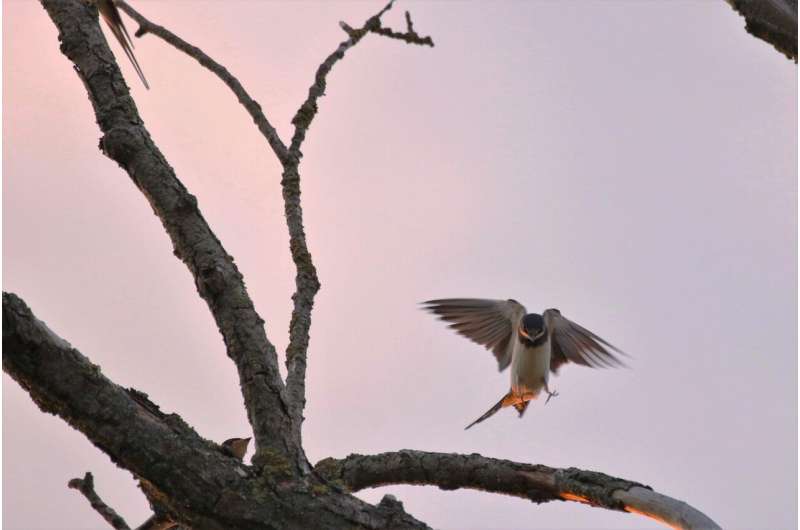Young tree swallows carry environmental stress into adulthood

Cornell University researchers have found that colder temperatures during tree swallows' development stage has an effect on swallows later in life.
For the past seven years, Maren Vitousek, assistant professor of ecology and evolutionary biology, and her research group have been studying a population of tree swallows in the Ithaca area.
When they analyzed breeding and hormone data, the team found a negative relationship between the temperature during the birds' development and their hormonal response to stressors as adults.
"This study is part of a growing body of research showing that relatively minor differences in the environment in which an individual develops can have significant consequences for how they cope with stress later in life," Vitousek said. "This phenomenon could help explain how changing environments are impacting many different species."
Doctoral student Jennifer Uehling, a member of the Vitousek Lab, is lead author of "Developmental Temperature Predicts the Adult Response to Stressors in a Free-living Passerine," which published Dec. 3 in the Journal of Animal Ecology.
"For this study, we followed tree swallows from eggs to adulthood, which is an approach that is rarely possible because it is difficult to follow wild animals over the course of their lives," Uehling said. "If the ambient temperature was cold during natal development, then the adult swallow tended to show a greater increase in glucocorticoid levels in response to a challenge when it was incubating its own young."
Glucocorticoid hormones help regulate metabolism and play a key role in coordinating how birds respond to stressors. In some species, including tree swallows, the levels of these hormones can predict reproductive success in certain contexts.
The data for this study also draw upon on a robust, 30-year dataset of the Ithaca-area tree swallow population. This allowed the team to correlate temperatures during development with the adults' responses to stressors over a greater period of time and understand how the birds were responding to changes in the environment.
"Our study hints that climate change could affect avian survival, reproductive success and populations in a more indirect way," Uehling said. "Changing environmental temperatures during development could affect glucocorticoid levels in adulthood, which mediate adult reproductive success."
The team is already exploring further study.
"One line of research that we are currently pursuing is trying to understand how temperature alters the physiological systems involved in responding to stressors, and whether the internal microbiome plays a role," Vitousek said. "Another big focus of our research is identifying consequences of showing a particular stress coping strategy. How do differences in stress coping strategy influence health and fitness?"
More information: Jennifer J. Uehling et al. Developmental temperature predicts the adult response to stressors in a free‐living passerine, Journal of Animal Ecology (2019). DOI: 10.1111/1365-2656.13137
Journal information: Journal of Animal Ecology
Provided by Cornell University
















